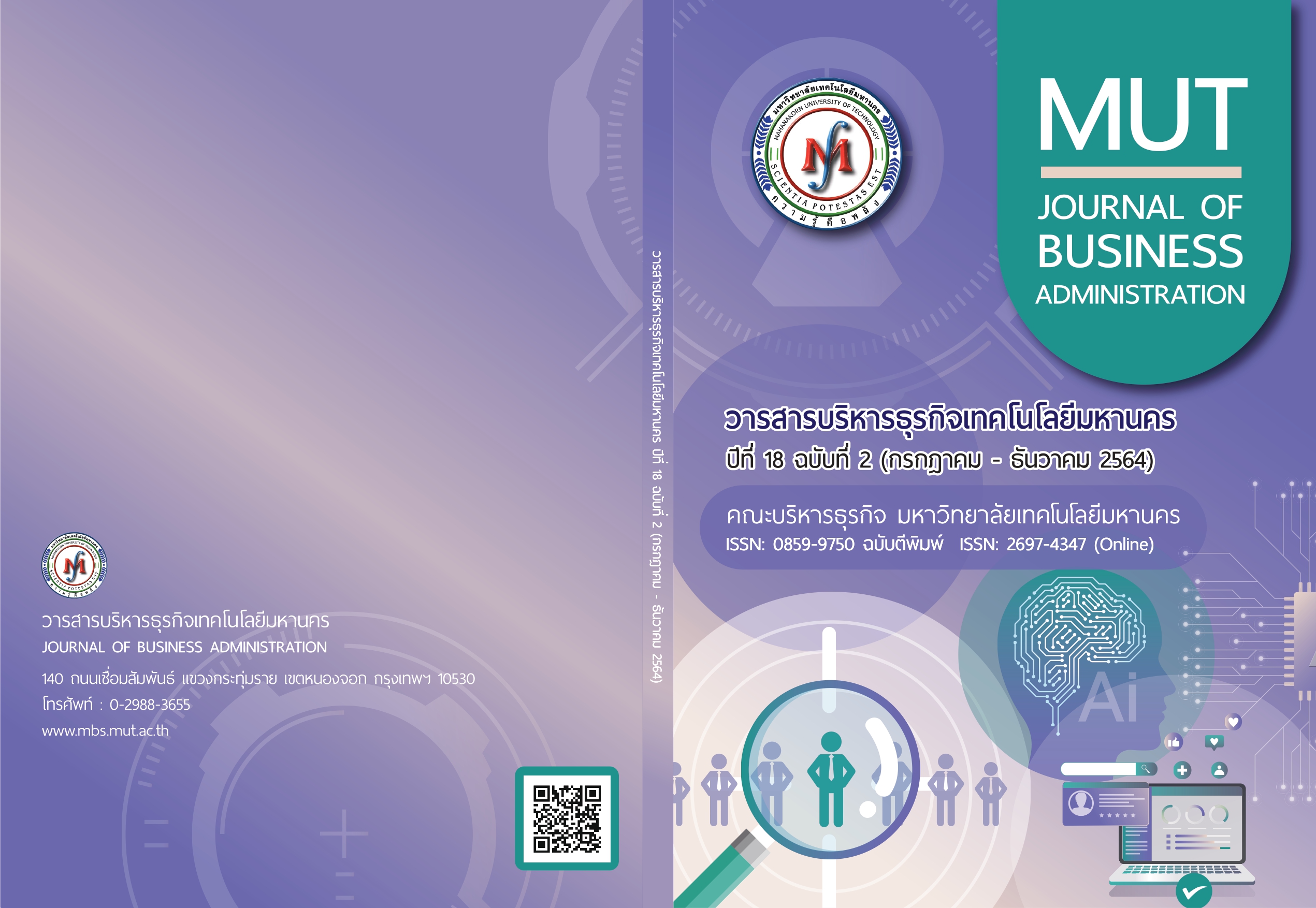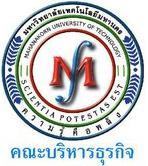The Impact of Disposal Behavior on Business after the COVID-19: A Preliminary Holistic View of Thai Business
Keywords:
COVID-19 pandemic, Consumer Behavior, Disposal Behavior, BusinessAbstract
This academic paper aimed to reveal how the COVID-19 pandemic impacted consumer behavior by considering the possible effects of these impacts on business after the COVID-19. According to the aforementioned purpose, the literature on disposal behavior was reviewed. After that, relevant articles on disposal behavior and information of the consumer behavior and trend during the COVID-19 pandemic were explored. This paper demonstrates the relationship between the disposal behavior described in the literature and the possible impacts of COVID-19 on the disposal behavior. Furthermore, it revealed that the disposal behavior impacted business opportunities and sustainable business operation.
References
behaviour in the Brazilian coffee-in-capsules market: promoting circular economy. International Journal of Production Research. 57 (23). 7269 – 7288.
Ali, S., Khalid, N., Usama Javed, H. M., & Zahurul Islam, D. M. 2021. Consumer Adoption of
Online Food Delivery Ordering (OFDO) Services in Pakistan: The Impact of the COVID-19 Pandemic Situation. Journal of Open Innovation. 7 (1). 1 – 23.
Aydınlıoglu, O., & Gencer, Z. T. (2020). Let me buy before I die! A study on consumers’ panic
buying behaviours during the Covid-19 pandemic. Turkish Studies. 15 (6). 139–154.
Bank of Ayudhya Public Company Limited. 2021. Weekly Economic Review. Retrieved April
30, 2021 from https://www.krungsri.com/en/research/macroeconomic/weekly/weekly-
210420
Bank of Thailand. 2021. The effect of COVID-19 toward Thai labor market. Retrieved April
30, 2021 from
https://www.bot.or.th/Thai/ResearchAndPublications/articles/Pages/Article_12Oct2020.
Butu, A., Bruma, I. S., Tanasa, L., Rodino, S., Dinu Vasiliu, C., Dobos, S., & Butu, M. 2020.
The Impact of COVID-19 Crisis upon the Consumer Buying Behavior of Fresh Vegetables Directly from Local Producers. Case Study: The Quarantined Area of Suceava County. Romania. International Journal of Environmental Research & Public Health. 17 (15). 5485.
Cruz-Cardenas, J., & Aravalo-Chavez, P. 2018. Consumer Behavior in the Disposal of
Products: Forty Years of Research. Journal of Promotion Management. 24 (5). 617 – 636.
Dogan, S. 2020. Identifying the Potential Effects of Coronavirus Prevention (Covid-19) on the
Restaurants / Cafes and the Consumer Preferences After Post-Epidemic in Turkey. Turkish Studies. 15 (6). 415 – 432.
Gilal, F. G., Zhang, J., Gilal, N. G., & Gilal, R. G. 2019. Linking self‐determined needs and
word of mouth to consumer e‐waste disposal behavior: A test of basic psychological needs theory. Journal of Consumer Behavior. 18 (1). 12 – 24.
Huang, R., Dahl, D. W., Li, S., & Zhou, Q. (2019). The Effect of Packaging Perceptual Cues
on Consumer Disposal Behavior of Partially Consumed Products. Journal of the Association for Consumer Research. 4 (4). 352 – 362.
Islam, M. T., Dias, P., & Huda, N. 2020. Waste mobile phones: A survey and analysis of the
awareness, consumption and disposal behavior of consumers in Australia. Journal of Environmental Management. 275. N.PAG.
Islam, M. T., Dias, P., & Huda, N. 2021. Young consumers’ e-waste awareness,
consumption, disposal, and recycling behavior: A case study of university students in Sydney, Australia. Journal of Cleaner Production. 282. N.PAG.
Jezewska-Zychowicz, M., Plichta, M., & Królak, M. 2020. Consumers’ Fears Regarding Food
Availability and Purchasing Behaviors during the COVID-19 Pandemic: The Importance of Trust and Perceived Stress. Nutrients. 12 (9). 2852.
Kamkankaew, P. 2020. Corporate Brand Management: The Way to Success for Small and
Medium Enterprise. Journal of Management Sciences, Suratthani Rajabhat University. 7 (2). 218 – 238.
Kamkankaew, P. 2021. A Stakeholder-Oriented Sustainability Brand Management: An
Introductory Review. Journal of Marketing and Management. 8 (1). 99 – 129.
Kamkankaew, P., Charoensok, K., Phattarowas, V., Limpiaongkhanan, P., Chongyosying, C.,
Sribenjachot, S. & Tantaweechet, D. 2021. How Does The Risk Perception of COVID-19 Affect Thai Consumers' Travel Intention? Romphruek Journal. 39 (2). 11 – 38.
Kunpluem, P. 2020. Business Adaptation after the COVID-19 Era. Journal of Politics,
Administration and Law. 12 (2). 99 – 110.
Laitala, K. 2014. Consumers’ clothing disposal behavior - a synthesis of research results.
International Journal of Consumer Studies. 38 (5). 444 – 457.
Moon, J., Choe, Y., Song, H., & Tchounwou, P. B. 2021. Determinants of Consumers’
Online/Offline Shopping Behaviors during the COVID-19 Pandemic. International Journal of Environmental Research & Public Health. 18 (4). 1593.
Nainggolan, D., Pedersen, A. B., Smed, S., Zemo, K. H., Hasler, B., & Termansen, M. 2019.
Consumers in a Circular Economy: Economic Analysis of Household Waste Sorting Behavior. Ecological Economics. 166.
Nenckova, L., Pecakova, I., & Sauer, P. 2020. Disposal behavior of Czech consumers
towards textile products. Waste Management. 106. 71 – 76.
Paço, A., Leal Filho, W., Ávila, L. V., & Dennis, K. (2021). Fostering sustainable consumer
behavior regarding clothing: Assessing trends on purchases, recycling and disposal . Textile Research Journal. 91 (3/4). 373 – 384.
Phulwani, P. R., Kumar, D., & Goyal, P. 2021. From systematic literature review to a
conceptual framework for consumer disposal behavior towards personal communication devices. Journal of Consumer Behavior. 1.
Qi, X., Yu, H., & Ploeger, A. 2020. Exploring Influential Factors Including COVID-19 on
Green Food Purchase Intentions and the Intention–Behavior Gap: A Qualitative Study among Consumers in a Chinese Context. International Journal of Environmental Research & Public Health. 17 (19). 7106.
Ratner, S., Lazanyuk, I., Revinova, S., & Gomonov, K. 2021. Barriers of Consumer Behavior
for the Development of the Circular Economy: Empirical Evidence from Russia. Applied Sciences. (2076 – 3417). 11 (1). 46.
Sarigöllü, E., Hou, C. & Ertz, M. (2021). Sustainable product disposal: Consumer redistributing
behaviors versus hoarding and throwing away. Business Strategy and the Environment. 30 (1). 340 – 356
Songsraboon, R. 2020. Indicators of the Success of Using the Food Ordering Applications
during the COVID-19 Pandemic. MUT Journal of Business Administration. 17 (2). 114 – 129.
Starostin, V., Samokhodkin, E., & Elzon, A. 2020. Changing Consumer and Brand Behavior
in the Early Stages of the COVID-19 Pandemic in Russia. European Research Studies. 23 (4). 531 – 546.
Taufik, D., Reinders, M. J., Molenveld, K., & Onwezen, M. C. 2020. The paradox between
the environmental appeal of bio-based plastic packaging for consumers and their disposal behavior. Science of the Total Environment. 705. N.PAG.
Testa, F., Iovino, R., & Iraldo, F. 2020. The circular economy and consumer behavior: The
mediating role of information seeking in buying circular packaging. Business Strategy & the Environment. 29 (8). 3435 – 3448.
Yuan, X., Li, C., Zhao, K., Xu, X., & Tchounwou, P. B. 2021. The Changing Patterns of
Consumers’ Behavior in China: A Comparison during and after the COVID-19 Pandemic. International Journal of Environmental Research & Public Health. 18 (5). 2447.
Zhang, L., Wu, T., Liu, S., Jiang, S., Wu, H., & Yang, J. 2020. Consumers’ clothing disposal
behaviors in Nanjing, China. Journal of Cleaner Production. 276. N.PAG.
Zhong, Y., Oh, S., Moon, H. C., & Ryu, K. 2021. What Can Drive Consumers’ Dining-Out
Behavior in China and Korea during the COVID-19 Pandemic? Sustainability. 13 (4). 1724.
Downloads
Published
Issue
Section
License
ข้อความ ข้อคิดเห็น ข้อมูล เนื้อหา รูปภาพ แผนภูมิ แผนผัง เป็นต้น ที่ปรากฏและแสดงในบทความต่างๆ ในวารสารบริหารธุรกิจเทคโนโลยีมหานคร ถือเป็นความรับผิดชอบโดยตรงของผู้เขียนบทความนั้นๆ มิใช่เป็นความรับผิดชอบใดๆ ของวารสารบริหารธุรกิจเทคโนโลยีมหานคร และมหาวิทยาลัยเทคโนโลยีมหานคร
บทความที่ตีพิมพ์ในวารสารบริหารธุรกิจเทคโนโลยีมหานคร ถือเป็นลิขสิทธิ์เฉพาะของคณะบริหารธุรกิจ มหาวิทยาลัยเทคโนโลยีมหานคร หากบุคคลหรือหน่วยงานใดต้องการนำทั้งหมดหรือส่วนใดส่วนหนึ่งไปเผยแพร่ต่อหรือเพื่อกระทำการใดๆ จะต้องได้รับการอนุญาตเป็นลายลักษณ์อักษรจากคณะบริหารธุรกิจ มหาวิทยาลัยเทคโนโลยีมหานครก่อนเท่านั้น


